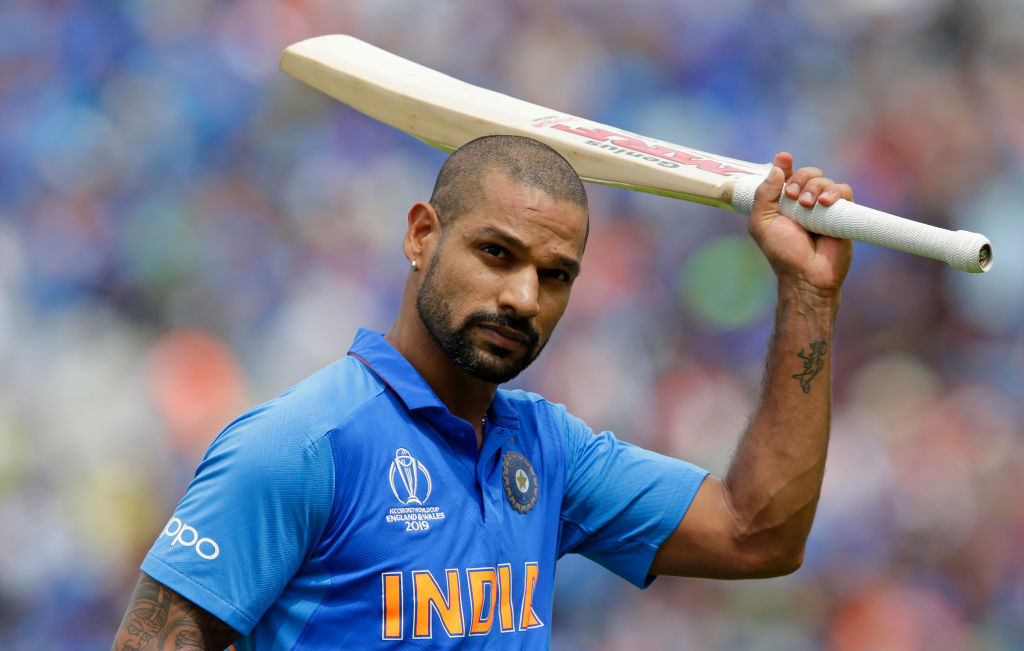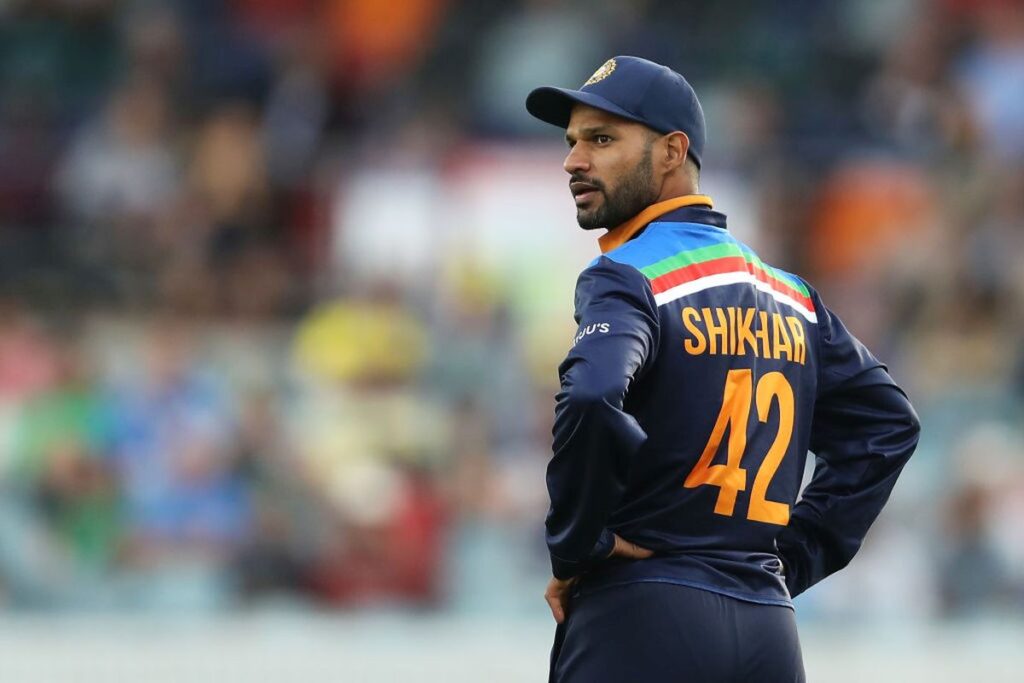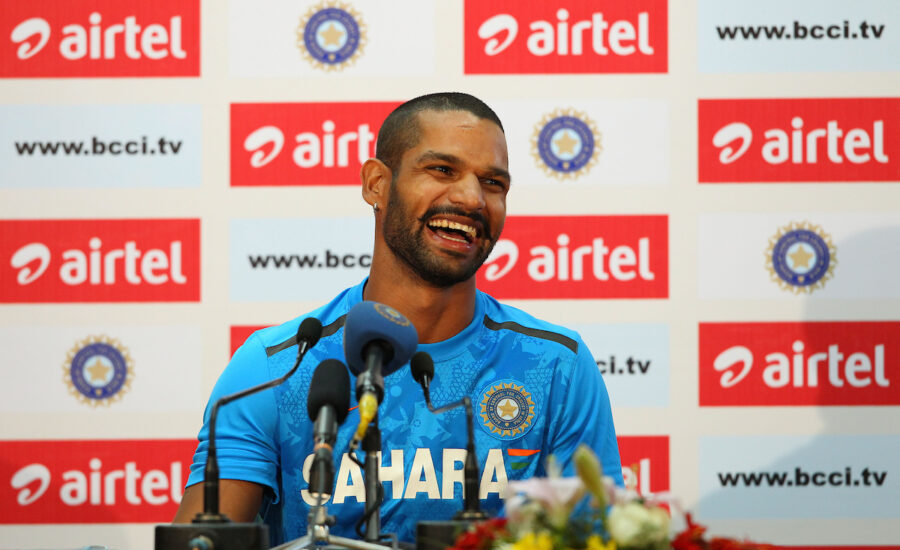On Saturday, August 25, 2024, Shikhar Dhawan, one of India’s best white-ball cricket batters, announced his retirement from the game.
In his maiden match, an ODI against Australia in 2010, Dhawan was removed for a duck, giving his international career an unfortunate start.
A few years later, in Mohali, India, he made an incredible return by hitting a superb 187 in his Test debut against the same opponents.
In that Test, he scored a century on 85 balls, which remains the fastest century by a debutant.
The 38-year-old, who represented India in Test cricket from 2010 to 2022, amassed 2,315 runs at an average of 40 in 34 matches. However, he came into his own in the white ball categories.
As a great batsman in the 50-over game, Shikhar Dhawan amassed 6,793 runs at a strike rate of 91 in 167 ODIs and significantly contributed to India’s 2013 Champions Trophy victory.
In addition to having an impressive run at bat in the 2015 ODI World Cup, he was also the leading run scorer in the subsequent edition in 2017.
He also made history in T20 cricket, amassing 1,759 runs in 68 international matches. In the Indian Premier League, he amassed 6,769 runs at a strike rate of 127 in 222 games, including 51 fifties and two hundreds.
His childhood instructor, Madan Sharma, was taken aback by Dhawan’s abrupt announcement of his retirement from competition.
“I never thought he would quit with such unexpected ease. In an exclusive interview with Harish Kotian, Sharma said of Shikhar, “He was happy to step aside once he realized there were good young players ready to take his place.”
How do you view Shikhar Dhawan’s career now that you were the first coach, and how proud are you of your ward?
I am experiencing a mixture of both happiness and sadness.
His lengthy and prosperous career has delighted him, but as a coach, you can’t help but wish your player played more. Last year, I thought he could have participated in a few more IPLs and the 2023 World Cup.
A player never wants to give up. He wants to continue playing if he can maintain his fitness, but Shikhar was a different kind of player.
Since many talented new players, including Shubman Gill, Yashasvi Jaiswal, and Ishan Kishan, are emerging, he believed stepping down gently and allowing the following generation to lead would be best.
Every player must retire at some point, at which point he might pursue other interests or remain involved in cricket.

Did he talk to you before or after his retirement announcement?
He didn’t talk to me about retiring, and I didn’t think he would do so now.
According to our conversation on Sunday morning, it was his own choice. He had conferred with his relatives before making the choice
His father, with whom I also spoke, concurred that it was his choice.
He sustained an injury during the Indian Premier League, and at 38 years old, healing takes time.
The most important thing is that if you have a clear mentality about making the decision to retire and pursue your other plans, it will be simple.
Therefore, there was no back and forth; he was unequivocal in believing that his playing days were finished.
Everybody has their own time.
When he first joined the team, he replaced renowned players like Gautam (Gambhir) and Viru (Virender Sehwag).
With Shikhar, he was willing to step aside as soon as he realized capable young players were waiting to take his position. He has personally appreciated and wished for the opportunities of individuals such as Gill, Jaiswal, and Ishan Kishan.
He believed that I should be content with whatever God has given me. Likewise, he never displayed avarice in any area of his life.
He is a highly devout man who prays frequently and feels content with whatever is written for him.
Gabbar hai dil se bhi woh! (His heart is enormous!)
When did you first lay eyes on Shikhar Dhawan?
When he was twelve, I believe it was during the 1996–1997 season that we first crossed paths. At our Delhi Sonnet Club, we held our summer camp. Shikhar Dhawan came to our club with the help of Rambabu Gupta, the international umpire at the time.
When I first watched him bat, he was a 12-year-old left-hander and made some incredible shots.
He needed to put in more effort for the team since he used to become upset when we lost a game. Thus, he was a diligent player from the beginning.
Even at that young age, he showed a lot of potential. Some of your players achieve maximum results with minimal effort.
Even though he didn’t have much control over the shot then, he used to flip a long way and had some good shots, such as the cover drive.
He was excellent in terms of his batting flow, and as he continued to practise, he improved technically.
He quickly joined the Delhi squad and hasn’t looked back since. After being dumped once, he took over and established himself there.
He continued to climb the ladder of success, playing for the India U-19 Asia Cup, the World Cup, the Ranji Trophy, and finally, the Indian squad.
Shikhar Dhawan had a fantastic attitude on the pitch—he was constantly upbeat and grinning.
He used to have fun even when he played for our Sonnet Club in Delhi.
He could grin and cheer everyone up, even when he felt negative. When we lost, he punished himself by saying, “I should have won the match for my team. “
Even though he was in pain internally, he always kept the dressing room environment with his teammates upbeat. He thought that to achieve, you should enjoy yourself and not feel under pressure when playing the game.
Since earning his India debut, Shikhar Dhawan has focused a lot of effort on his batting. Since 2013, he has removed many flaws from his hitting and developed it to the point where he can consistently score runs.
Yes, he put a lot of effort into his batting. You must be ready because, as a hitter, between 70 and 80 percent of the balls you face will be outside the line of the off stump. Some bowlers will continue to bowl outside the off stump, hoping that you will play the cover drive and gain the advantage over others while driving, and they will stay caught up.
Therefore, improving yourself is a continuous process that lasts throughout your career rather than just a day or a week.
You experiment a lot, such as practicing counter swings with a plastic or damp ball before traveling to England or getting ready for the bounce tracks in Australia or South Africa. He used to work hard to get prepared for every tour.
Shikhar Dhawan most admirable quality was his exceptional mental toughness. To be well-prepared for every series, he used to give everything he had during practice sessions, which were meant to mimic match conditions.
In your opinion, he was among India’s most excellent white ball cricket openers.
He and Rohit Sharma had a deadly opening tandem for a few years.
He performed in major ICC competitions, such as the ODI World Cup in 2015 and the Champions Trophy in 2013 and 2017. Not only that, but he was passionate about the grand stage.
Yes, in white-ball cricket, he was an exceptional batter. As you mentioned, he performed admirably in 2019 with a century against Australia despite being limited to playing in only two games due to injury. He also won the Champions Trophy in 2013, the World Cup in 2015, and the subsequent Champions Trophy in 2017.
His batting approach was suited to the bounce and pace of the international wickets, which made him so successful in major competitions. He cherished seeing the ball land on the bat.
He also performed admirably in red-ball cricket, starting with the Under-17 division and moving on to the Under-19 and domestic divisions. Making hundreds and double hundreds in red-ball cricket boosts your confidence that you can perform well in any situation when playing white-ball cricket.
He may have played more restricted over games in the past because, in my opinion, there were more white ball games played back then than red ball games.
However, Shikhar never wavered in his conviction that the Test format is the most important and that performing well in Tests is the only way to be considered a good player.
In 2013, Shikhar stunned the cricket world by being the fastest rookie to reach a century in a Test match in Mohali, India.

Is it any sorrow that he only played 34 Tests in the end, considering his career as a coach and possibly even for Shikhar Dhawan?
I used to consider this all the time. I’ve always thought Shikhar should participate in at least 70–80 Test matches during his career. His batting talent was enormous. I also wanted him to play over 200 ODIs in white-ball cricket.
But his career was occasionally hampered by ailments in between.
He played two games in the 2019 World Cup before being forced to withdraw due to injury. He played well then and hit a century against Australia, which India won. Still, the injury happened at the wrong time, and he could not continue playing.
As I recall, he scored a century in a Test match at Galle, Sri Lanka (during the 2015 series), but he was injured once more and missed the final two Test matches while he was playing well.
Thus, while injuries have undoubtedly contributed in other ways, his overall record is strong, except for England (in 2018). Unlike Virat Kohli, no Indian batter performed well in that series.
After all these years, how is your friendship with Shikhar Dhawan going?
We didn’t have much money back then, so we usually traveled by car or taxi. I recall that I used to ride with Shikhar Dhawan on an old scooter that we both possessed, but we used it frequently for practices and games. Back then, our sole concerns were increasing our playing and training schedules rather than considering the purchase of an automobile.
I used to order dinner for everyone or pay for other necessities for the kids out of my pocket. We played in many additional tournaments and had many boys at the club, so we spent much time together, but Shikhar never complained.
You could tell immediately that Shikhar had what it took to be a world-class performer. His personality, aptitude, and commitment made it evident from a young age that he had what it took to succeed.
Looking back now, I find it hard to believe that more than 20 years have passed so quickly.
Not even Shikhar can contain his amazement at how quickly time passes. It seems like yesterday when I first came to you as a little child to play club matches and bat in the nets. You used to yell at us when we didn’t perform well or compliment us when we did.
It feels so impressive that he can still recall all those little details from those days. When you play at such a high level, you tend to forget the past, whereas Shikhar cherishes every memory from the past.
He has visited our club whenever he needed some practice, up until recently.
What lasting impression would you have of Shikhar Dhawan?
Following Shikhar’s lead, I tell the younger students at my academy, “The mindset is more important than technique or planning.” You must possess mental toughness.
Shikhar used to take his preparation in the nets exceptionally seriously and was able to apply what he acquired there to win a match.
He was so sure that there was never a doubt in his mind. He never strayed from his natural game; he never altered it.
I use the fact that he played for India after leaving this club as an example for the children. It would help if you were motivated because he put much effort into getting where he did.
Do you want someone with Shikhar Dhawan level of love for cricket to continue to be involved after he retires?
Of course! If cricket has given you so much, it’s only fitting that you return the favor. You have many options, including coaching, commentating, and selecting.
I’m sure Shikhar Dhawan will continue to communicate. He has already gotten things started by purchasing a team in the Delhi Premier League, which has opened doors for about twenty young people from Delhi.
In addition, he oversees an NGO that provides aid to people experiencing poverty. Thus, he contributes to both the game and society as a whole.
All we can do is wish him well in all of his pursuits.
Also Read : Watch: Ben Stokes Suffers Major Injury, Carried Off The Pitch By Teammate
